 History
History  History
History  Weird Stuff
Weird Stuff 10 Wacky Conspiracy Theories You Will Need to Sit Down For
 Movies and TV
Movies and TV 10 Weird Ways That TV Shows Were Censored
 Our World
Our World 10 Places with Geological Features That Shouldn’t Exist
 Crime
Crime 10 Dark Details of the “Bodies in the Barrels” Murders
 Animals
Animals The Animal Kingdom’s 10 Greatest Dance Moves
 Movies and TV
Movies and TV 10 Box Office Bombs That We Should Have Predicted in 2025
 History
History 10 Extreme Laws That Tried to Engineer Society
 History
History 10 “Modern” Problems with Surprising Historical Analogs
 Health
Health 10 Everyday Activities That Secretly Alter Consciousness
 History
History 10 Dirty Government Secrets Revealed by Declassified Files
 Weird Stuff
Weird Stuff 10 Wacky Conspiracy Theories You Will Need to Sit Down For
 Movies and TV
Movies and TV 10 Weird Ways That TV Shows Were Censored
Who's Behind Listverse?

Jamie Frater
Head Editor
Jamie founded Listverse due to an insatiable desire to share fascinating, obscure, and bizarre facts. He has been a guest speaker on numerous national radio and television stations and is a five time published author.
More About Us Our World
Our World 10 Places with Geological Features That Shouldn’t Exist
 Crime
Crime 10 Dark Details of the “Bodies in the Barrels” Murders
 Animals
Animals The Animal Kingdom’s 10 Greatest Dance Moves
 Movies and TV
Movies and TV 10 Box Office Bombs That We Should Have Predicted in 2025
 History
History 10 Extreme Laws That Tried to Engineer Society
 History
History 10 “Modern” Problems with Surprising Historical Analogs
 Health
Health 10 Everyday Activities That Secretly Alter Consciousness
10 Great Scam Baiting Operations
If you’ve checked your email anytime in the last twenty years, you’ve likely been subjected to appeals from mysterious foreign nationals promising you money for nothing. Or, more accurately, a whole lot of money for only a little of yours — wired internationally to someone you don’t know. Most of these scams involve you supplying seed money, or disclosing confidential data used to deplete your savings account. While these cons are usually recognizable and safely ignored, enough suckers are fooled to make the effort profitable for the criminals who have no fear of legal retribution. Fortunately, a new breed of counterspy, the scam baiter, has risen to our defense. Aware they can’t stop the legions of online con men, these brave souls do their best to waste as much of the scammer’s time and resources as is humanly possible. The results are often hilarious. Submitted for your approval are 10 clever and involved scam baiting operations. Be sure to follow the source links if you can, because the transcripts are too lengthy to publish in this format.
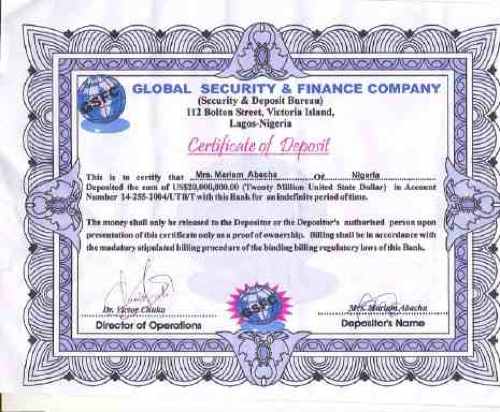
Included because the online documentation of this full-on runaround is so user-friendly it’s a great introduction to scam baiting. Seriously, this guy could have taken notes in law school. Fully color coded email entries and annotated notes detail the plan of, and correspondence with, Maryam Abacha, wife of the late military head of State for Nigeria. According to her unsolicited email to a total stranger, she has $30 million in cash and needs to get it out of the country but doesn’t trust her family. She even includes hyperlinks from BBC.com to bolster her credibility. However, our scam baiter, Mr. “Dick Heyd” feigns interest and begins “the game”, as he calls it. Heyd proceeds to complicate a deal for a transfer of $20,000 from him in exchange for ‘the consignment’ (presumably the money), and he claims to have already sent $7500 to a Mr. Mbeki at Global Security in Amsterdam, who he believes is in the employ of Ms. Abacha. (Ms. Abacha has no idea who Mbeki is — Heyd made it up). The preferred drop site is London (where Abacha obviously has contacts), so Heyd fixates on Amsterdam and won’t budge. Finally they relent, but Mr. Heyd has security concerns. Appearing spooked in emails and using a fellow scam baiter in Amsterdam, he feigns travel to Amsterdam and concocts a last minute cancellation of the exchange, citing security protocols for him as the CEO of Bovine Excreta Custom Manufacturing. Via the fellow scam baiter in Amsterdam, he is able to describe the very people sent to fetch him from the hotel, since they were casing the lobby at the prescribed time and making ‘massive amounts of phone calls’. Heyd then plays Mbeki and Ms. Abacha against one another and swears to never work with Mbeki again or the deal’s off. The annotated notes indicate the scammers are now VERY confused, and they propose a new dropsite in China with new contact John Kuma. Heyd agrees but secretly emails Kuma with an offer of a 50/50 split and a Green Card for US citizenship. To top things off, he also fakes an email from Mbeki threatening Abacha, telling her to stop ruining his scam. Ms. Abacha (and I’m sure her whole scam gang) is now totally flummoxed, so Heyd slips her Kuma’s incriminating email response to the offer of US citizenship. Then he lets her know that Kuhn is trying to have her bumped off, with an itemized payment schedule for the assassins. After that, there haven’t been any more emails from Ms. Abacha. I’m worried for her…aren’t you? [Source]
This scam baiting operation is unique in its scale—backed by an American network news budget, full camera team, and travel expense account, investigative reporter Chris Hansen decides he wants to follow a 419 scam all the way through, and expose the criminals in this ‘faceless’ crime. To do this, his team answers a lot of scam emails and send seed money early in the conversations. The scams are simple— the victim is promised millions of dollars for helping someone supposedly in need, but first the victim must pay thousands in processing fees (and of course the millions never arrive). Again, because Hansen sent money early in his communications, several separate scammers offer to do something they rarely do— agree to meet him in person. So Hansen and his team fly to London to meet their defrauders in public places, local bars, and even hotel suites, filming the confrontations in a fashion similar to his groundbreaking “To Catch a Predator” series.

“Prince” Joe Eboh, the purported chairman of the “Nigerian Delta Development Commission (NDDC)” promised millions to anyone who could help him siphon off excess revenues from the late head of state, General San Abacha (does he know Abacha’s wife is trying to do the same thing?). Using a familiar “church” theme, scam baiter “Father Hector Barnett” responded to the email, since he was looking to provide financial assistance for new converts. Barnett spun a story of how the ministry was founded in 1774 by Betsy Carrington, who spent years spreading the holy gospel to the Masai. In fact, they even initiated her into “The Order of The Red Breast” via a ceremony where she had to mark the top half of her nude body with red paint as a gesture of faith. As a result, she was immediately accepted, and remained one of the most trusted westerners known at that time. As a qualification to enter the Holy Church of The Order of The Red Breast, Barnett told Prince Eboh that all converts must also complete the initiation that Miss Carrington did. Barnett even included a photograph of four young men going through the procedure. Eboh predictably jumped at the chance and supplied a photo of himself with a spray painted ‘9’ around his nipple, and even sent $80 in processing fees for the promised $18,000 (which has never been sent). The $80 received (most likely stolen) was later sent to a children’s charity in the north of England. The email correspondence goes on to this day, even through the traumatic death of Father Barnett’s good friend Minny Mowse, his doomed plans to spend church money exporting snow to Siberia, and failed dreams of joining the circus. Since then, Prince Joe Eboh rockin’ his ‘9’ has become an icon in the scam baiting community. [Source]

The primary goal of scam-baiting is to distract the scammer so he can’t rip off anyone else. And that’s what happened when scammer “F. Williams Smith” from the “Special Committee for Budget and Planning of the Ministry of Petroleum” contacted scam baiter “Derek Trotter”. Smith offered 25% of $10.5 million in exchange for an “account in which the funds will be transferred.” What he got instead was a carpentry assignment from Mr. Trotter, who posed as an arts dealer. Through clever emails and the promise of $100,000, Trotter lured Mr. Smith into creating elaborate wood carvings–some of which were pretty good, and obviously took time to construct. In the end, after weeks of paperwork, disagreements over shipping fees, and the untimely “death” of Derek Trotter, the deal fell apart, and everyone parted ways. Later, scammer “John Boko” also fell for the Derek Trotter treatment and also submitted a wooden replica of the sample figure. But due to “shipping shrinkage” Trotter claimed the piece didn’t meet the agreed-upon specifications and the submission was refused. So Boko was given a second chance, only this time he had to carve a replica of a Commodore 64. Which he did. [Source]
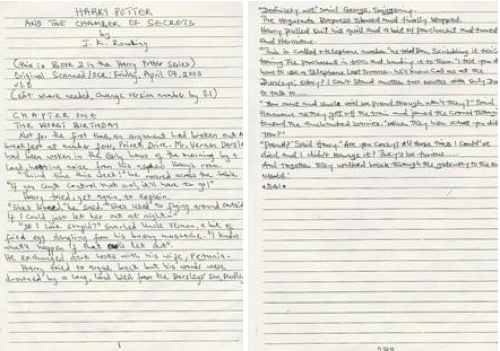
After offering millions of dollars for a few thousands in advance, alleged attorney for “the late President of the Federal Republic of Nigeria”, Barrister Mussa Issah, fell deep into the clutches of mastermind “Arthur Dent.” Dent claimed that his company was conducting a research project on “Advanced Handwriting Recognition and Graphology systems”, and offered Mr. Issah $100 per handwritten page of any text. Dent demanded a strict minimum of 100 pages, and anything less would be rejected outright. Issah fell hard, and transcribed all 293 pages of “Harry Potter and the Chamber of Secrets”, each page meticulously handwritten. Sadly, the deal fell through for some reason. [Source]

From July to August 2006, scam baiter “Troy McClure” weaves a story of ready cash at the NASA compound he cleans in Namibia. However, if the money were to go missing, Troy would be the first suspect. He needs a partner like Steven Okama–the scammer–to come and get it. A month of emails, Internet phone calls, and visits to a fake web page keep Mr. Okama breathlessly engaged, until the two decide to stash the money in a watertight GPS-enabled cashbox on a deserted beach. Okama’s brother-in-law, Tony, agrees to pick up the money using online GPS coordinates (from Troy’s fake website), and the pickup will be confirmed when the online location of the cashbox changes. Then Okama will deposit the money in a South African bank account for dispersal. Tony dutifully heads out to the beach and is horrified when he discovers that the box is not there. Okama is livid. Fortunately, Troy convinces them that the box was swept out to sea and he’s tracking its movement up the Namibian coast. Okama keeps asking for money to hire a boat, and begins complaining of medical problems that prevent him from retrieving the box. Eventually, the baiting loses steam as “Troy” plans to get the money himself now that the box is out of Namibia. And since Steven won’t spring for a boat, he’s cut out of the heist. [Source]
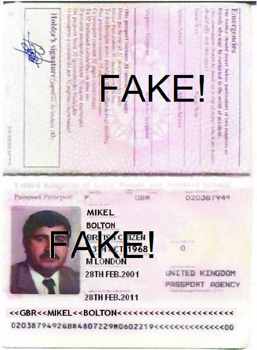
This elaborate bait is as complete as it is lengthy, and I confess to getting lost in places— which is why it probably worked so well. The scam baiter pretended to be “Calvin Huckle”, a naïve scam victim just ready for the taking. The original goal was to just run up a scammer’s long distance fees. But then Huckle (and many of his other online identities) came into contact with British banker “Mikel Bolton”, who was willing to lend him up to $150,000 without ever meeting him. Posing as a fellow scam artist making a good living sending fake checks, Huckle co-opted the scammer(s) into contacting former 419 victims. Unbeknownst to them, Huckle had the real victim’s permission to assume their online identity for the duration of the sting. Hollywood thrillers have nothing on this: the counterscam involved a boggling 11 separate storylines and several times Huckle contacted other scam baiters by accident, but they agreed to corroborate one another’s stories to the real criminals. Luckily, during the operation, our hero obtained a list of 86 intended victims, and he notified each of the plans to defraud them. Of course, some believed him, and others thought he was running a scam (which is progress, I think). [Source]
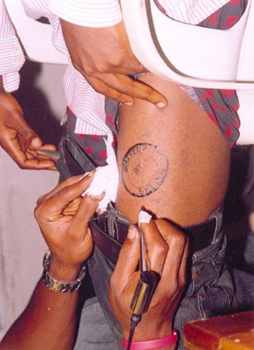
Scammer Ahmed Sadiq first contacts scam baiter “Lance Myboyle” for airfare money to Mecca. However, Ahmed’s lie of attending Weister City University in London quickly fails — mainly because it doesn’t exist – and British citizen Lance tells him so in no uncertain terms. Oddly, Ahmed is unfazed and continues to ask for money. Their discussions ferret out that Ahmed lives, not in London, but Nigeria, and if he really needs money, he should contact Father Bruce Corbin, of the Church of the Tattooed Saint. Email exchanges with Father Corbin inform the scammer that a donation can only be made if Ahmed converts to the church and gets a tattoo of the Order somewhere on his body. I think you know where this is going. After many emails, Ahmed gets a BIG tattoo “Baited by Shiver” on his left leg (other scammers have used their arms). Tragedy then strikes, as Father Corbin passes away from a Tribble infection, and Ahmed is passed between a jive-talking pastor and a disgruntled ex-con volunteer. However, Ahmed’s demands for money continue unabated, even when he’s passed on to an “Inspector Morse”, who is investigating embezzlement by employees of the Church of the Tattooed Saint. Ahmed even sends a laughably fake passport to the Inspector, who insists on releasing the “owed” funds only after proper identification is presented. The baiting ends when the gullible Ahmed suspects the Western Union email receipt from Frank Sinatra of 221B Baker Street looks a little “iffy”. Realizing he’s totally busted, Ahmed first gets belligerent and then tries to play on sympathy. But make no mistake – this playa got played for four straight months, and even has a sweet “tat” to show for it. [Source]
Who needs Chris Hansen and his NBC budget? Scam-baiter “Jack Ophten” doesn’t— he got the scammer to come to him! Ophten and his pals at 419hell love “being jerks to those who deserve it”, and no one deserved it more that Frank Owusu, who was using email spams to sell phony gold dust. Ophten was able to convince the scammer that he was a scammer, too, and needed help defrauding his aged father-in-law. In emails and phone calls, Ophten played the parts of fellow scammer and scam victim for Owusu and his partners in crime. Unbelievably, Ophten even convinced Owusu to pay for his own travel from Ghana to St. Louis, USA, to defraud Ophten’s father-in-law. When finally confronted in the lobby of the St. Louis Crown Plaza Hotel, Owusu bolted like a spooked racehorse. Too bad he was in such a hurry: he left his bag of real gold dust behind (appraised value: $200). Ophten documented the entire operation on both audio and videotape, and did everything he could to include cybercrime law enforcement. However, despite email death threats from someone he’s met in person, the Missouri state attorney’s office, the local sheriff, and the FBI politely refused to get involved at any point of the operation. [Source]
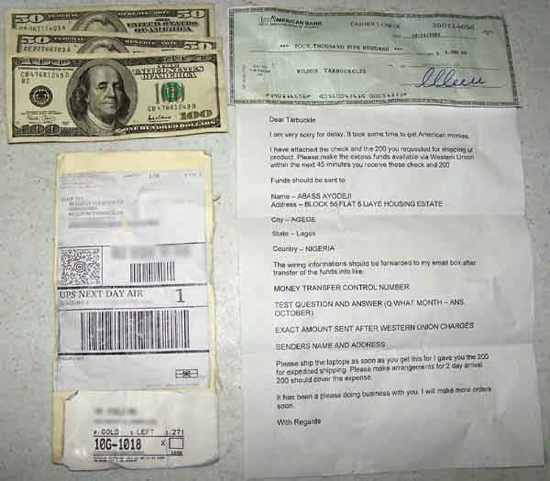
The mother of all scam baiting operations has to go to scam baiter “The Failure”, who may or may not work in a New York computer shop. Too bad scammer “Cole” didn’t know his intended victim was a regular at www.scambaiter.com. What happens over the next several weeks was documented day-by-day online, and even involved many of the website’s readers. It all started when “Martin Cole” sent a fake check to buy some laptops for shipment overseas. Failure’s alias “Warren Turnbuckle” protested he could not ship overseas without all freight fees paid, in cash, up front. Since he was paying with a fake check anyway, Cole sends the cash, but cunningly overpays the $4000 bill with a $4500 check, and asks Turnbuckle to refund him the $500 overpayment within 45 minutes of receiving the check. Turnbuckle responds that he can’t cash the check for 5-10 days, but will sell the laptops anyway if Cole sends a shipping courier to pick them up. Turnbuckle also promises to refund the shipping costs once the check finally clears. Cole bites, and agrees to pay for freight for several “Anus” brand computers, arranging for UPS to pick up them the very next day (far ahead of the check bouncing). So Failure packed 7 large boxes with garbage, dead CD ROM drives, and two trashed laptops with “ANUS” scratched on the screen. Estimated shipping charges totaled $3,186.67. UPS was in on the sting, and agreed to not deliver until Cole paid them for shipment. Scambaiter.com readers wanted in on the joke as well, and when the shipment was suspiciously diverted to Manchester, UK, a reader posed as city worker offering to fix Cole’s house as part of an urban renewal project. Cole then proceeded to show the “damages” he did to his own house after receiving ‘a bunch of rubbish in the post”. Photos, audio recordings, shipping labels, and hilariously incoherent death threats from the ‘governor’ and the dreaded ‘Clique Mob’ can be found on a now-classic thread that spans 80+ pages. NSFW, but worth an hour’s reading all the same. [Source]








